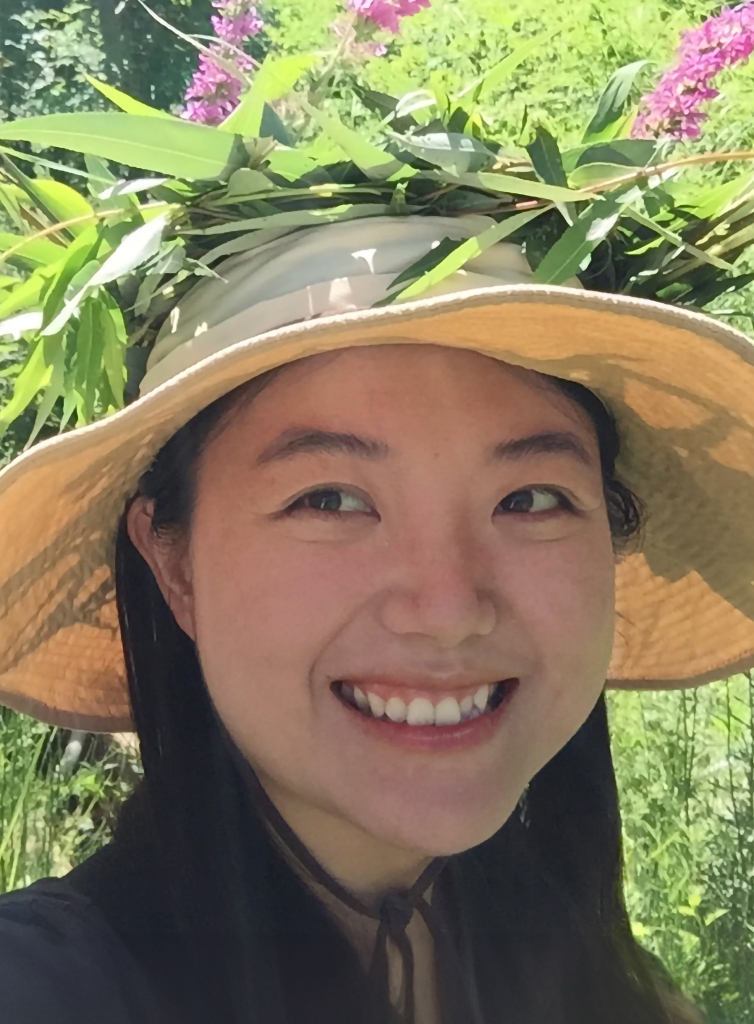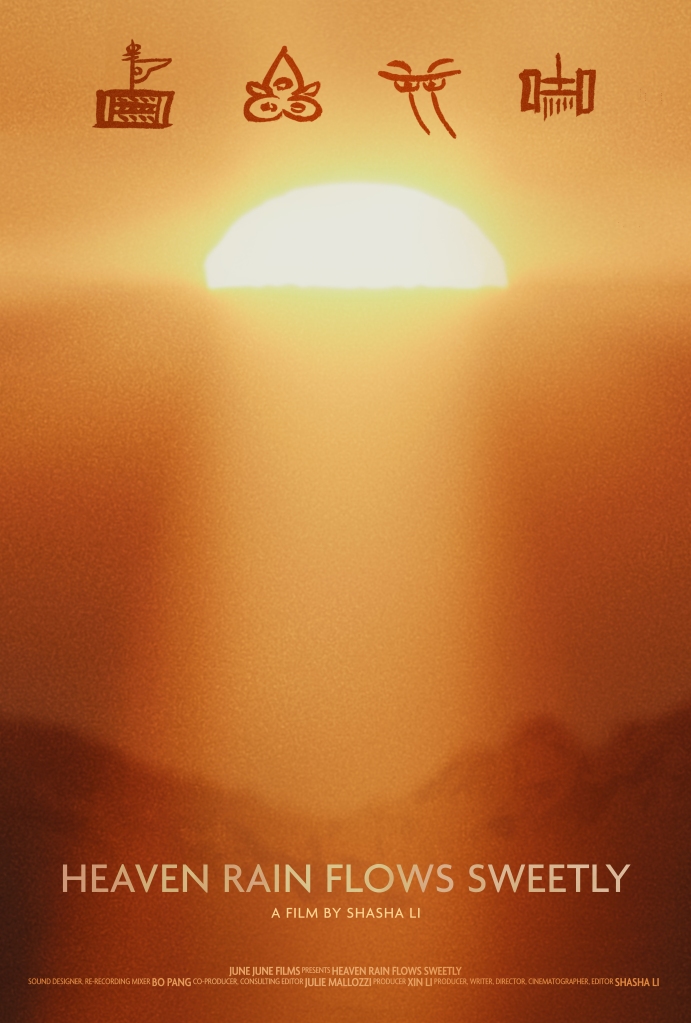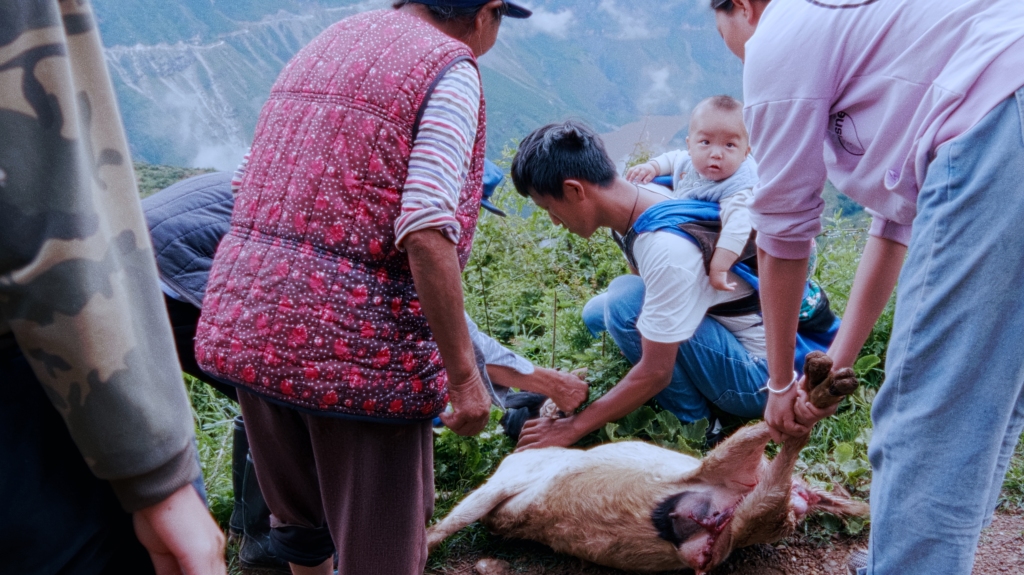Shasha Li’s debut film is a tender and wandering meditation on home and the elements—earth, fire, water, and air. Made over the course of five years and punctuated by world events like wildfires and the pandemic, Heaven Rain Flows Sweetly compares the vitality of nature in Eugene, Oregon with that of Li’s ancestral home in Lijiang, China, at the foothills of the Himalayas.
Speaking with me in December from Los Angeles, Li told me about the naming of the film, which I was curious about. ‘Heaven Rain Flows Sweetly’ is a translation from Mandarin to English, but the characters in Nakhi are a homophone meaning, ‘Go read.’ In the film, Nakhi glyphs which comprise an ancient writing system that has weathered wind, rain, and many more human-made changes, serve as a gateway to connecting with Li’s ancestry.

Li has had a circuitous path to the film world. She attended business school and became an accountant for a big-four firm in New York City. After some soul searching, Li then changed direction, later studying film at the USC School of Cinema Arts.
Our interview has been edited for length and clarity.
Anqi Shen: The soul searching you’ve done comes across in Heaven Rain Flows Sweetly. How did your nomadic experiences influence the making of the film?
Shasha Li: I can’t tell you how many times I’ve moved in my lifetime. I think it’s a little bit of fate. When I moved back to Lijiang to live with my grandparents as a little kid, that was such a special period of my life. I felt like I went through a time machine and ended up in this timeless, very utopic place. That was a big inspiration for this film, and I also think as I move again and again and see more of the world … the more I realize how special the Lijiang of my dreams and my childhood is. It exacerbates my nostalgia and longing for home.
AS: I’m from Beijing originally. I moved when I was about three years old. Whenever I go back, I feel like it’s a very different world. It’s almost like a parallel universe.
SL: That’s what I say!
AS: One thing I was thinking about was the concept of language in this film. How did you navigate between different languages and dialects, including English?
SL: I think a lot of it comes naturally when you’re bilingual and a first-generation immigrant. It’s natural to speak English in one scenario, and in my case sometimes I speak Mandarin and sometimes I speak Yunnanese with my family. With my grandma I speak Yunnanese but she also speaks Nakhi sometimes. We did have to decide, in terms of the voiceover, to use both English and Chinese in the process of editing, because for the longest time I was struggling with confronting the footage I had compiled and finding the narrative thread.

AS: I’ve always been drawn to the naming of things. Could you talk about how you decided on the title for your film—Heaven Rain Flows Sweetly?
SL: I didn’t decide on the title until pretty late in the process. Earlier on, I really liked the expression, but it doesn’t really roll off the tongue in English. If you start a title with the word, heaven, it immediately has so many layers of connotation and meaning to different people. I was hesitant to use it, but I think when the film actually came together, I thought this was the best title. It was a very open-ended process of filming and a journey of growth for me personally.
I learned about these Dongba stories that ended up in the film, so for me, that’s kind of like my reading into these ancient stories. … It’s kind of a miracle that this language has survived just like Lijiang has survived thus far, despite the changes.
Dongba culture itself has so much to do with nature worship. The title of the film, Heaven Rain Flows Sweetly, is a direct translation of the Chinese title, tian yu liu fang, whereas “tian yu liu fang” is a Mandarin homophone of the Nakhi phrase, “go read.” It’s a well-known Nakhi bilingual expression. I think the title implies that reading can nourish the soul just like rain can nourish the earth. I’ve come to see the film as a meditation and an offering to nature, and also a prayer. I think tian yu liu fang can be read in Chinese as a prayer to pray for the appropriate amount of rain that we receive on earth—not too much, not too little. There’s the connotation of hoping for a harmonious relationship with nature. A lot of us don’t really have one anymore.

AS: Thank you, that was such a lovely elaboration of these vignettes from the film that keep coming back to me. I was thinking a lot about Indigenous knowledge and how it’s gone away with our obsession with productivity, with capital.
In terms of craft, I see that you’re physically present in the scenes with your camera, I can tell that you were very hands on in this film. How did you approach the cinematography?
SL: The camera was definitely an extension of my own eyes. I shot it and was for the most part was the only one on location. It was almost like I was just hanging out with these people going through these life moments, just having the camera there to record and document those moments.
I don’t really think about technique when it comes to cinematography. It was great to practice in the first year when I was in Eugene, Oregon. It was activism and environmental meetups, not so much personal, compared to much of the footage that made it into the film. I didn’t think about editing too much during filming, and later it really came around as a major obstacle and steep learning curve. On the other hand, it was a blessing that I was just in the moment, didn’t really think about expectations in terms of conforming to the narrative requirements.
AS: Were there any surprises you encountered in the course of filming?
SL: I think all the time, and that’s where the magic happens. For example I love the encounters with animals—the squirrel eating a cherry flower, seeing a falcon or an eagle flying through New York City—I love that, and those are always surprises. I think it’s almost like going fishing in the ocean of reality and seeing what the catch of the day is. That was my way of thinking about cinematography.
AS: I think the few minutes you have from Oregon in the film really set the stage for the distance and how far you’ve physically come in making the film. Did you get a chance to see the film with a live audience at DOC NYC?
SL: Yes, I did, and it was so amazing. I really didn’t know how the audience feedback or Q&A was going to be. It definitely played faster in the theatre compared to when I was just editing on my small screen and watching it on my own. During the screening, I was amazed by how there were reactions to all these tiny moments and story beats, for example in the scene where I visit my family home with grandma early on. I was worried that would be slow, but there were so many little giggles about my interaction with my grandma that really told me the audience just got every little nuance.
AS: What are you working on now?
SL: I’m working on a few projects, both narrative and documentary. One of my interests is continuing to explore the intersection of nature, traditional culture, and spirituality, which came into focus during the making of Heaven Rain Flows Sweetly.

Leave a comment